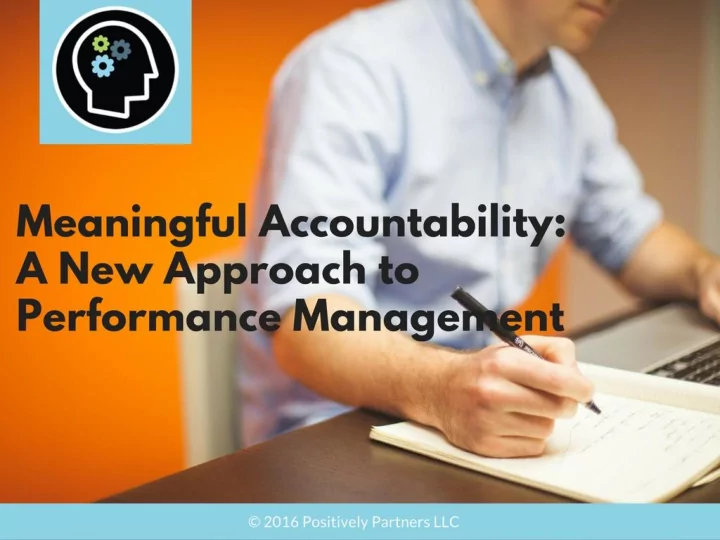

Positively Partners Positively Partners is a social enterprise that helps schools and nonprofit organizations achieve exceptional performance from their employees. We are psychology practitioners, human resources professionals, trainers and system design experts working together to create highly productive, mission-driven, work communities . Innovation Award
Agenda
Performance Management ● A process by which people are enabled to perform to the best of their abilities. ● A whole work system that begins when a position is created and ends when an employee leaves the organization. ● It is not just performance appraisals , but the series of steps taken by managers to support, develop, coach, understand and connect with their direct reports. Source: Heathfield, Susan M. "Performance Management Is NOT an Annual Appraisal." N.p., n.d. Web. 06 Jan. 2015.
We Need A Little Discipline
Remembering When Your Your Best Worst Remember a Remember a time when a time when a manager manager failed positively to propel shaped your forward your performance. performance. What made it What made it work? fail?
Widely Used Practices... Most organizations use the same practices to manage performance… …yet fewer than 3% get the results they are seeking. Source: Ashford, Orlando, ed. "2013 Global Performance Management Report" (2013): n. pag. Mercer Talent. Web. 3 Jan. 2015.
...with Minimal Impact Discussion Point: Why might these elements not work to drive performance? Source: Ashford, Orlando, ed. "2013 Global Performance Management Report" (2013): n. pag. Mercer Talent. Web. 3 Jan. 2015.
Defending Performance Appraisals Organizations maintain traditional approaches to performance management because: ○ Perceived legal protection (documentation & record keeping) ○ Rationale for decision making (hiring, firing, promotion) ○ Insights for succession planning and training ○ Rationale for compensation decisions ○ Promotes consistent employee experience
Defending Performance Appraisals Coaching Compensation Analysis Results Remediation
Reasons for Shortcomings 1. Competing priorities - employees want recognition and managers want to see improvement. 2. Lack of trust - do I care what my manager thinks? 3. Numbers label people - are you judging me or my work? 4. Process is complex - can one manager do it all for each direct report? 5. Failures of servant leadership - am I here to judge or help? Source: Culbert, Samuel A., and Larry Rout. Get Rid of the Performance Review! New York: Business Plus, 2010. Print.
Neuroscience: The SCARF Model Neuroscience: the SCARF Model
Neuroscience: The SCARF Model Neuroscience: the SCARF Model Source: Rock, David “SCARF: a brain-based model for collaborating with and influencing others” (2008).
Kotter vs. Heath Bros
Neuroscience: The SCARF Model Neuroscience: EDSO
Neuroscience: The SCARF Model Neuroscience: Oxytocin
Case Study: Citizen Schools Setting the Stage : Citizen Schools used a traditional performance management process for many years that included the practice of managers rating employees on goal attainment and competencies twice annually (mid and end of year).
Context & Complications Lack of Alignment with Goal Setting: On average, fewer than 40% of ❏ employees had set goals with their managers before the start of the mid year review cycle. Non Compliance: Less than 50% of managers completed a midyear ❏ review with their direct reports, although virtually 100% completed an end of year review because the scores were linked to merit increases in compensation for the following year. Rating Inflation: Senior leaders reported that scores submitted for the ❏ end of year review were often inflated in order to justify a merit increase that the manager wanted to secure for their employee. Not Timely: Leaders also reported that its often took 3 - 3.5 months for ❏ managers to submit their midyear reviews.
Desired Outcomes Design and implement a performance management process that achieves meaningful accountability for Citizen Schools staff: ➔ More frequent, less formal ➔ Conversational, bi-directional ➔ Focused on employee strengths ➔ Elimination of competency rating
Proof of Success Citizen Schools continues to use Meaningful Accountability ★ and has seen dramatic increases in levels of employee engagement since implementing this new practice (as measured by Gallup Q12). Questionnaires completed by managers and employees, ★ each quarter for the past 18-24 months, show that 98% of managers and employees believe that the process provides high quality, meaningful opportunities to discuss their progress working towards business goals, as well as opportunities to achieve career progression.
Why does it work?
Meaningful Accountability Dedicated weekly one-on-one interactions of at least 30 minutes that allow managers and direct reports to catch-up, review tactics for goal 1:1s attainment and position managers to help remove roadblocks to success. Deep dives four times per year to review progress towards goals at key milestones and Quarterly include structured dialogue about strengths, Performance organizational values, career growth or Conversations employee engagement. On-going opportunities for managers and direct reports to share specific and timely feedback Continuous with each other. Investing in each others Informal success by providing key insights to promote Feedback growth and excellence.
How to Implement Implementation of components of this approach require a tailored roll out plan that focuses on: Generating buy-in and understanding of managers ➔ Frequent and small group discussions ➔ Building skill and comfort for managers on leveraging ➔ strengths in driving and creating accountability for their employees Modeling techniques for facilitating genuine conversations ➔
The 3 C Model
The O3 Structure for 1:1 Meetings Position your direct reports for success in meeting goals through weekly one-on-one sessions of at least 30 minutes -- preferably one hour.
Scaffolded Conversations Organizational Values Career Development Engagement & Job Satisfaction Competency Development
Keep in Touch Jill Smerkers Adam Maurer Rory Smith Human Positive People Resources Psychology Systems jsmerkers@positivelypartners.org amaurer@positivelypartners.org
Recommend
More recommend